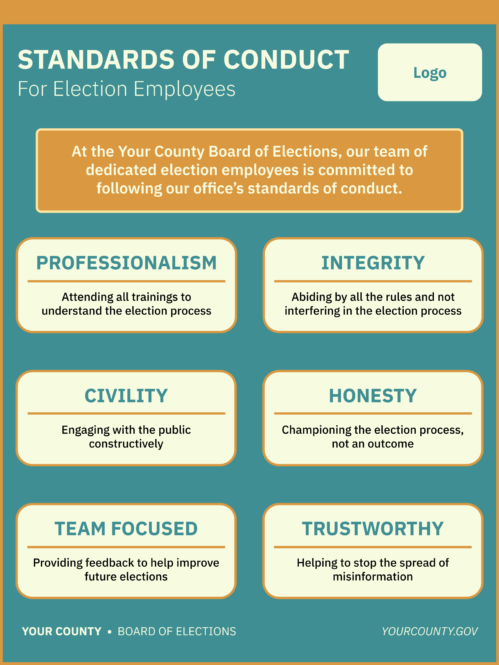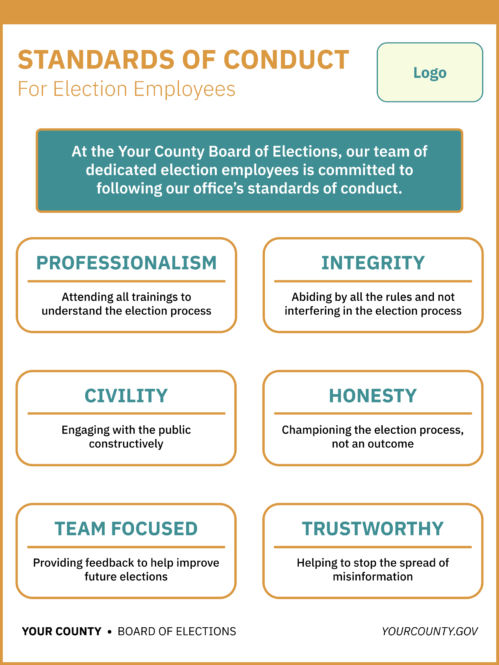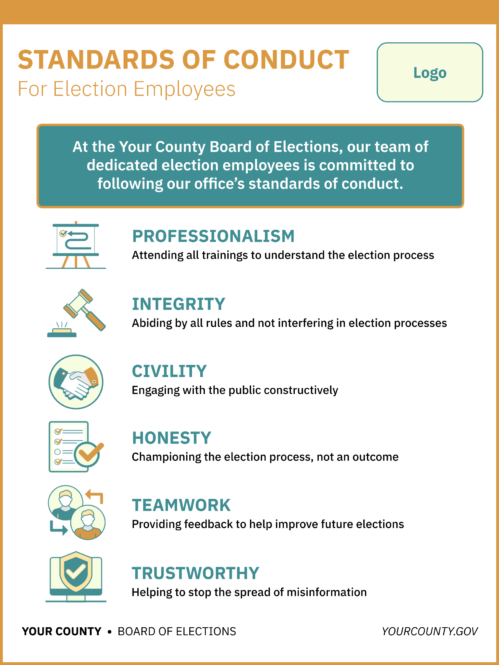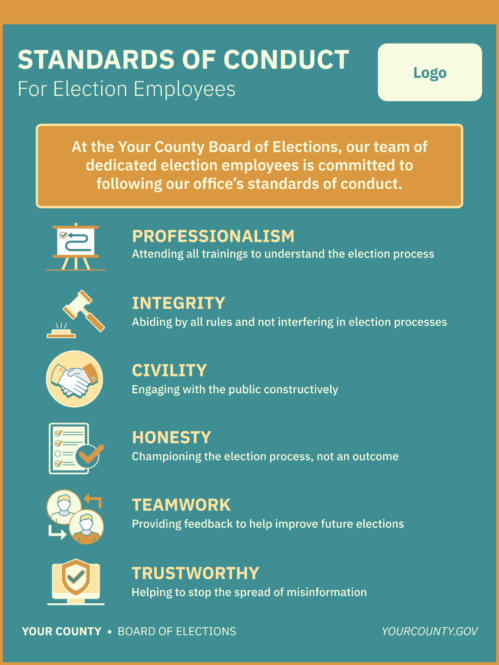June 15, 2022
Standards of Conduct for Election Workers
Download the Resources:
Standards of conduct set expectations for participant and observer behavior in normal election operations. Standards set the tone of the operating environment and create boundaries that – if crossed – identify individuals displaying unexpected or unacceptable behaviors. When early intervention of threatening or disruptive behavior becomes an expected part of the operation, it ceases being a reactive distraction.
This guide will outline:
- Oath of office versus standards of conduct
- Identifying behaviors that violate election law
- Examples of standards of conduct
- Role of training and core competencies
- Monitoring and reporting
Understanding The Guide
Election officials are responsible for conducting an election that not only runs smoothly but follows the law. Myriads of “election workers” are needed, including full- and part-time staff, temporary and seasonal workers, and volunteers often representing political parties. Highly skeptical individuals may volunteer to serve in one of these capacities, hoping to uncover fraud being perpetrated or flawed practices. In all of this, voters are looking for assurances that the work done in an election – by professionals, other workers and volunteer partisans – is free from malice or political bias.
Why establish standards of conduct?
In the current socio-political climate, election officials face a growing reality that anyone with access to election infrastructure (ballots, equipment, buildings, people, etc.) can intentionally or unintentionally cause harm. These insider threats could include elected officials, election staff and seasonal workers, governing board members, other county or state officials, observers, members of the public, and even law enforcement members. Most of these official participants take an oath to defend the constitution of their state and the Constitution of the United States.
For some, a deep skepticism and even cynicism – arising from the current information environment – has changed what it means to “uphold the constitution” or “uphold the law.” To be clear, there are times when challenges to procedures (by workers, poll challengers, or observers) are appropriate. However, some participants acting within official duties may feel they are upholding the Constitution by interfering with an election or challenging procedures. In this circumstance, a sworn oath may no longer be enough to ensure laws and protocols are followed. Establishing standards of conduct may provide an additional layer of protection to the election process.
When and how?
Written standards of conduct should be developed and deployed ahead of each election and reviewed afterward. Considering the duties of the election official in administering elections, there are likely implied duties for election workers that can underpin the legal and moral authority of such standards, particularly with the support of legal counsel. Standards can be successfully incorporated into:
- New hire orientation (full- and part-time staff as well as temporary or seasonal workers)
- Election worker training
- Candidate, political party, and observer trainings and guides
- Public meetings and observation opportunities (logic and accuracy testing, auditing, canvass/certification, etc.)
What will be needed?
- Key provisions from state election law on statutorily allowed and prohibited conduct at voting locations and observation opportunities
- Clear description of non-statutory conduct norms including enforceable consequences for behavior outside of the norm – up to and including removal
- Documented authority from human resources and/or attorney’s office.
- Clear legal guidance for when you can dismiss an election worker or remove an unruly observer
Using The Guide
Table of Contents
- Oath of Office vs. Standards of Conduct
- Behavior-Based Standards of Conduct Rooted In Violations of Election Law
- Examples of Values-Based Standards of Conduct
- Role of Training and Core Competencies
- Monitoring and Reporting
Oath of Office vs. Standards of Conduct
Oath of Office
An oath of office is an affirmation a person takes before assuming the duties of an office. We rely upon oaths under a belief that a person’s honor and word are sufficient to bind them to their duties and commitments. Most states and jurisdictions require oaths for elected or appointed officials, including election workers.
Taking the oath of office can be a powerful, emotional event. When a person understands the oath they take and the corresponding behaviors expected, they may develop a deeper commitment and take greater pride in the service they render. Beginning election worker training with the oath and expectations may reinforce the obligations of being a public servant.
However, the emotional power of oaths can create cross currents, and some people may be conflicted in their faithfulness to a particular election-related task, versus faithfulness to some other ideal. Because of this, an oath itself may not suffice to normalize conduct. Standards of conduct are not meant to replace the oath of office but to illustrate specific behaviors that are expected or behaviors that will not be tolerated, along with the consequences for not adhering to the standards.
Standards of Conduct
Many organizations (public and private) incorporate standards of conduct into their terms of employment. Those standards might include behavior that will result in termination, such as:
-
Failure to meet performance standards
-
Negligent or willful damage or waste of property
-
Acts or threats of violence, or the use of obscene, abusive or threatening language
In Weld County, Colorado, employees must “maintain a standard of conduct and performance which is consistent with the best interests of the County.” The charter outlines conduct that might result in discipline or termination, including:
-
Failure to comply with lawful orders or regulations
-
Dishonesty
-
Giving preferential treatment to individuals or groups
-
Breach of confidentiality
-
Any conduct likely to have an adverse effect upon the functioning of County government
-
Falsifying County records or reports
Similar employment-based standards are currently required for many employees around the country. Using those examples as a baseline in developing standards specific to election workers can fast track the development process. It may be possible to make the exact standards apply in the election context, both to seasonal/temporary staff as well as “volunteers.”
Anyone expected to comply should be informed of the standards of conduct and accept them as a condition of work. As applied specifically to partisan volunteer workers, there are benefits to gathering advice from and acknowledgement of political parties, particularly as any such standards are likely to be norm-based and lack the authority attached to employment-based standards.
Behavior-Based Standards of Conduct Rooted in Violations of Election Law
Every state’s election code identifies election crimes along with the punishment for violating the law. It is helpful to outline key provisions of your state election law related to conduct at voting locations and observation opportunities, particularly as it pertains to obstructing election officials and processes.
For example, Arizona has a law that prohibits interfering with an election official’s ability to lawfully carry out their official duties, including at voting locations and during the transport of voting materials and ballots.
A.R.S. § 16-1004: A person who at any election knowingly interferes in any manner with an officer of such election in the discharge of the officer’s duty, or who induces an officer of an election or officer whose duty it is to ascertain, announce or declare the result of such election, to violate or refuse to comply with the officer’s duty or any law regulating the election, is guilty of a class 5 felony.
In building behavior-based standards of conduct, election officials can outline specific behaviors that may not explicitly be named in the law but would interfere with an election official’s ability to lawfully carry out their duties.
The list might include:
-
Unplugging voting machines
-
Tampering with voting equipment
-
Interfering with, delaying or preventing voting
-
Harassing or intimidating a voter
-
Obstructing a voter from casting a ballot
-
Treating voters unequally
-
Delaying or inhibiting other workers from carrying out their duties
-
Assisting outsiders/non-election officials in any of the above
-
Unauthorized disclosure of information
-
Granting unauthorized access to facilities or equipment
-
Making statements about personal political views within the polling place
-
Making false statements about the conduct of the election and election officials
The idea is to connect specific behaviors with penalties and provisions in the law. These could be used independently or to help shape standards of conduct.
Develop a quick reference guide outlining the standards and how to report behavior outside the norm. Consider sharing this list with law enforcement so they know in advance what the code is, what a violation might look like, and what the authority is. A few election jurisdictions, including Orange County, California, have done this for years, recognizing that law enforcement officers have many laws to enforce and elections are a specific niche.
In 2022, a committee of election officials and law enforcement personnel are working together on a set of guides – one of which is a draft guide applicable to the laws of every state and ready for use by election officials.
Examples of Values-Based Standards of Conduct
Consider modifying and administering the Carter Center code of conduct and pledge for official and unofficial election observers.
Modified, it might look something like this:
-
I have read and understand the [Jurisdiction Name] Code of Conduct for Election Workers & Observers. I hereby pledge that I will follow the Code of Conduct and that all of my activities will be conducted completely in accordance with it. I have no conflicts of interest – political, economic or other – that will interfere with my ability to act in an impartial manner and to follow the Code of Conduct.
-
I will maintain strict political impartiality at all times. I will make judgments based on the highest standards for accuracy of information and impartiality of analysis, distinguishing subjective factors from objective evidence, and I will base all of my conclusions on factual and verifiable evidence.
-
I will not obstruct the election process. I will respect state and federal laws and the authority of election officials, and will maintain a respectful attitude toward all voters. Where I have objections or concerns I will elevate them through established channels.
-
I will protect the integrity of the election and will follow the instructions and training provided by the [Jurisdiction Name]. I will attend all training and briefings as requested. As a worker, I will refrain from making personal comments, observations or conclusions to the news media or the public unless specifically instructed otherwise by the responsible official.
Another way to craft standards is to focus participants on positive normative behavior.
For example:
-
I will champion the election process and not an outcome
-
I will abide by all the rules and not interfere in the election process
-
I will attend all trainings so I can understand the election process and what I’m seeing
-
I will engage with the public constructively
-
I will help stop the spread of misinformation
-
I will provide feedback to election officials to help improve future elections
Role of Training and Core Competencies
Adequate training, coupled with the skills and competencies necessary to administer elections, plays an important role in ensuring adherence to standards of conduct. This is true for election officials and staff as well as election workers and outside observers.
Where practical, consider ways you might assess election workers or others participating in the election.
-
Screening. All candidates to serve as election workers should be screened for the ability and suitability to faithfully perform their duties prior to assignment. Within the rules and practices of a jurisdiction, the following are suggestions to consider:
-
Demeanor
-
Comprehension
-
Communication/language
-
Computer literacy
-
-
Testing. Testing should be conducted after training to determine their ability to:
-
Perform critical tasks
-
Use equipment correctly
-
-
Performance. The performance should be evaluated on an ongoing basis to ensure that expectations are being met. This might be accomplished through informal evaluations or peer reviews.
It is not possible to train election workers to have the same level of knowledge and problem-solving ability as staff or assume they understand all the material they are given. A more realistic outcome is to train workers on how and when to use the tools that are available for them to get the help or information they need to resolve any issues. This might include:
-
Phone bank. Ensure phones are answered quickly, are staffed with trained operators, and calls are managed and documented.
-
Easily searchable guide. Organize training material and instruction guides in a searchable format that frames questions from the perspective of the election worker. This permits workers to find the appropriate response for their situation immediately.
-
Rovers. An on-site presence is often the best way to solve problems. Ensure that rovers document and report issues they assist with to refine future training and resources.
Consider creating a repository, such as a Google Form, where election workers and other staff can document and report issues. The City of Rochester Hills, Michigan, received a “Clearie” from the U.S. Election Assistance Commission in 2018 for creating an “Election Day Precinct Support Portal” that allowed election workers to submit requests or questions using a Google Form.
At a minimum, election workers should understand a voter’s rights (usually adopted by state law) and understand that the overriding expectation is that they will protect those specific rights for all voters.
Monitoring and Reporting
Train staff and election workers to report anyone behaving outside of security standards or behavioral norms so that the actions are documented and someone can take a closer look at the situation. It is also important to keep documented incidents in the worker’s record/file, so they are available to reference in future elections.
The widely publicized “See Something, Say Something” campaign for national security threats is a model to consider adopting in training and onboarding election workers, and it warrants continuous reminders to permanent and seasonal staff as well.
Consider designating a person responsible for the oversight of all security procedures, as well as training and compliance. This security coordinator can be empowered to facilitate the exchange of information and incident reports, and should be knowledgeable in all aspects of operational security.
Threatening or violent incidents should be reported to local, state and federal agencies regardless of severity or resolution status. This provides intelligence, aids in the facilitation of threat and pattern analysis, and may prevent future incidents in other places. It is essential that the designated security coordinator knows which agencies and contacts at the local, state and federal level to notify.
Developing standards of conduct supports this model. Including written expectations of behavior in a standards of conduct document can serve as a guide to help identify and report behavior that may be outside of the established security standards or norm.
Incident reports should be brief, complete, and timely to allow security contacts and decision makers to quickly determine what actions or mitigating actions, if any, should be taken. These reports may also serve as evidence for law enforcement as needed. A sample report format is below.

Standards of Conduct Posters
These public-facing posters can be featured in polling places, early voting sites and counting facilities to illustrate the shared values and principles that election workers uphold when conducting elections. Our template provides an easy-to-edit framework to help you create these standards of conduct posters for your jurisdiction.







